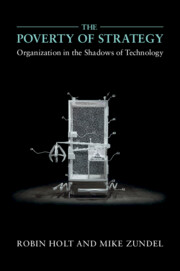Book contents
- The Poverty of Strategy
- The Poverty of Strategy
- Copyright page
- Dedication
- Epigraph
- Contents
- Figures
- Table
- Acknowledgements
- Introduction: Strategy as the Basic Question of Organization?
- Part I Authenticity
- Part II The Three Epochs of Strategy
- 4 Technē: Creating Organizational Forms from the Earth
- 5 Technology, Machinery and Giving Over to the General in Strategic Practice
- 6 Strategy as World Picture
- 7 Who or What Is Running Strategy?
- 8 Machine Intelligence and the Rhythms of Predictability
- 9 Strategy No Longer Thinks in Terms of Human Beings
- Part III The Open
- Index
5 - Technology, Machinery and Giving Over to the General in Strategic Practice
from Part II - The Three Epochs of Strategy
Published online by Cambridge University Press: 14 July 2023
- The Poverty of Strategy
- The Poverty of Strategy
- Copyright page
- Dedication
- Epigraph
- Contents
- Figures
- Table
- Acknowledgements
- Introduction: Strategy as the Basic Question of Organization?
- Part I Authenticity
- Part II The Three Epochs of Strategy
- 4 Technē: Creating Organizational Forms from the Earth
- 5 Technology, Machinery and Giving Over to the General in Strategic Practice
- 6 Strategy as World Picture
- 7 Who or What Is Running Strategy?
- 8 Machine Intelligence and the Rhythms of Predictability
- 9 Strategy No Longer Thinks in Terms of Human Beings
- Part III The Open
- Index
Summary
Chapter 5 details the emergence of machinery and organizational order through industrialization. No longer mere prostheses that allow humans to reach further, lift higher, hit harder or handle materials that would slice or burn skin, machine complexes and industrial installations no longer rely on the human body’s provision of labour force, but can instead conjure immeasurable forces from nature itself. Heidegger’s notion of the Gestell (enframing) characterizes these changes in terms of a gradual displacement of the human. No longer in control (or even in the picture), existence becomes wrapped up in continuously unfolding cycles of unlocking new resources, extracting, storing, distributing and switching over, in which whatever is made is always and only ‘there’ in potential service to what is to come: everything is a means for further progress, and progress is nothing more than the tightening and quickening of cycles of unlocking extracting, storing, distributing and switching. What is lost in this technological condition is the intimacy of the human being with their world; the care and concern that might be had for things understood as things in and of themselves, not merely input or output variables (and this includes fellow humans and the self).
Keywords
- Type
- Chapter
- Information
- The Poverty of StrategyOrganization in the Shadows of Technology, pp. 154 - 181Publisher: Cambridge University PressPrint publication year: 2023



